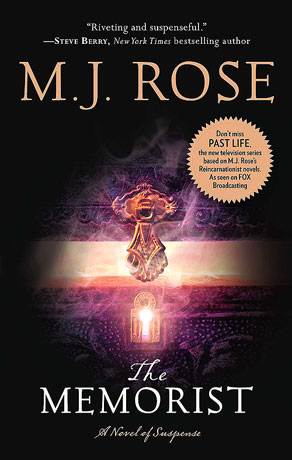THE BOOKS


Selected by Indie Booksellers for the Indie Next List.
Vienna, Austria
Thursday, April 24th 6:30 PM.
For a few minutes the cold stones turned into plush red chairs, gilt molding edged the rock walls and the crypt became a concert hall as two men listened to a symphony, lost in its sound. David’s wife had especially loved the Fifth and shutting his eyes, he allowed himself the indulgence of memory.
“Are you all right?” Wassong asked.
The music rose to a crescendo that filtered down the bowels of the earth, reaching his core. David didn’t hear Wassong’s question. At least, he was thinking, next week, when they were all ushered out of this world it would be on the wings of music that belonged to the angels.
“How far down are we?” David asked, back to business.
“Twelve or fourteen meters,” Wassong said. “Too deep for ground penetrating radar to find you and the perfect place to plant your explosives. Right here, right where we are standing. Nothing – not the building –not the audience will survive the attack. You have to admit, it’s an excellent spot, no?”
Pausing for a few more notes, David Yalom tugged the gray life raft from behind the stalagmite where he’d stowed it after coming across the subterranean lake two hours ago. Something was wrong, it was completely deflated. Flipping it over, he saw four short parallel rips on the underside. “How the hell did that happen?”
Wassong bent down and inspected the slashes. “The rocks are sharp here. When you pulled it up out of the lake you must have ripped it.”
“No, I remember, I lifted it up. I didn’t drag it, precisely for that reason,” David stared at the slashes. “Beside, these cuts are too clean to have been made on the ragged edges of these rocks.” Frantically, he scanned the cavern, his halogen beam flashing wild streaks of light on the rocky walls. “Someone did this. Someone is down here with us, Hans.”
“Impossible.”
“You sure? What if someone followed you here?”
“Me? Think about what you’re saying.”
“What’s going on then?”
“Maybe it was the rats.”
David’s light beam shinned right into Wassong’s light brown eyes. In an article, he’d once described them as surprisingly kind and he thought of that now.
“Rats, Hans?”
“There are thousands of vermin living in these tunnels, you’ve seen them for yourself. These marks certainly could have been made by a rat’s claws. There’s no reason to worry. You are overreacting – understand, I don’t blame you – the stress you are under would make anyone overact. But we still have my raft. If this were some kind of suspicious activity, my lifeboat would have been attacked also. We have enough rope to rig my raft so that I can go across and then you can pull it back and use it.”
There was no other choice. The water was thirty percent hotter than the human body’s temperature thanks to the geothermal heat under the lake’s bed. If you tried to swim across you’d be boiled to death.
“Did you look? Are you sure your raft isn’t damaged too?”
But it wasn’t.
Wassong pulled a coil of rope out of his knapsack and knotted it through the plastic ring in the raft’s rubber edging.
“This will work fine,” he said tugging on the knot. Done, he took his glasses off, wiped them on his bandanna, then wiped the bandanna across his forehead and finally put his glasses back on.
“Once I’m on the other side and give you the signal, you’ll be able to pull the boat back.” He picked up the rope and tossed it to David.
Watching Wassong paddling across the water, the steam mist shrouding him, David thought about the likelihood of a rat ripping through the PVC. As if he were attempting to reconstruct it for a newspaper write up, he ran through his and Wassong’s earlier actions once they’d reached the shore and stowed the boats. Did Hans have time to sabotage the raft? And if he had, why? Sweat dripped down David’s back. He unbuttoned his workshirt and mopped his brow with the sleeve. Reaching into his knapsack, he grabbed his last bottle of water and drank down what little was left. They’d only brought supplies for the day and the day was over.
He listened to the even splashing of Wassong’s oars.
When they’d come through this section earlier they hadn’t lingered. Just inflated the rafts, unfolded the oars, paddled across, stowed the boats and then continued on. No, he suddenly remembered, they had stopped. David had needed to record directions for the map he was keeping so he could find his way back on his own next week. What had Wassong been doing while David had recorded his notes?
He tried to remember, thought back a few hours ago, but what came to mind was another night. The last time he’d used the recorder before today. He’d been fast- forwarding through an interview he’d taped, rushing to file a story about an uprising in the Gaza strip, trying to find one last quote. He’d looked up at the clock. It was 6:02 PM and he’d thought – I’m going to be late. I’d better hurry – not imagining that by then everyone – everyone – in his family was dead. Killed when an explosive was thrown into his house during his middle son’s eighth birthday party. A gift from AhmedAbdul in exchange for David just doing his damn job.
Only he, late getting home that night, survived. Sparing his life was the sadistic trick of a god he no longer believed in. What kind of life could it be, would it ever be, when every minute of every day the slow motion imagery of finding the remains of that blast ran on an endless loop in his imagination, becoming more terrible with each replaying? That wasn’t how time was supposed to work on memory. It should be smoothing the edges and filing down its rough rim.
And it wasn’t just what he’d personally lost. The endless pattern of violence, reprisals, and more violence continued. Baghdad, Mogadishu, Tel Aviv, Sadr… David had covered terrorism since the mid 1990s, infiltrated sleeper cells, interviewed suicide bombers and their families. And now he though of a fellow reporter who had once written that facing an assault on its own survival, Israel should reject being a victim. “Instead,” he wrote, “it has the regrettable but clear corollary right to become an executioner. From the standpoint of providing security to its own citizens…this right has now become a distinct obligation.”
It was David’s obligation, too. Not just as a reporter. It was his personal obligation. He’d had seen the writing on the wall and it was written in his family’s blood: the time for building a better mousetrap was long past. There would always be a way to outsmart a new system. It wasn’t about mousetraps anymore but about changing the way both the mice and the trappers think. And it was about punishing the men who’d built the systems that failed his family. In five days those men would be in the crowd, sitting a dozen meters above these caves enjoying the gala performance of the Vienna Philharmonic at the end of their annual ISTA conference. All they’d given him was an apology, and that was so little.
The splashing ceased. Wassong had reached the opposite shore and climbed off the raft onto solid ground. As he bent over, the beam from his helmet created a spotlight around him and shined on something that glinted cold and bright in his hand.
Like every Israeli citizen David had spent two years in the army and was trained to quickly size up dangerous situations. As soon as his mind formed questions, he searched for answers. Instantly he knew Wassong planned to cut the rope and leave David stranded.
Wassong never had any intention of sending the raft back, had he? This was all planned. But why go through the charade of bringing him here and showing him the crypt? For the money? It had to be. David’s money first, and Abdul’s money after.
Instinct took over with the kind of strength only fury provides, David jerked on the rope and started pulling it back as quickly as he could. The unexpected lurch yanked it out of Wassong’s grip before he realized what was happening. Dropping the knife, he reached out with both hands for the raft. Wassong was trained too. He’d been a warrior all his life, but David was younger and stronger and the raft was already moving away from the shore.
Wassong misjudged its speed and arms outstretched, fell forward, screaming in anticipation even before he plunged into the water. Instantly, reacting to the pain, his body recoiled, lurching up, arching back. He was still screaming.
For a second David wondered if Wassong could somehow make it out. No, he knew that was impossible. He knew, because Wassong had warned him: no one survived the firewater. Wassong was splashing wildly, displacing a circle of water around him. He continued trashing for fifteen seconds, thirty seconds, forty, and then all movement ceased.
Hans Wassong lay still, floating face down in the boiling lake, his glasses bobbing beside him.





